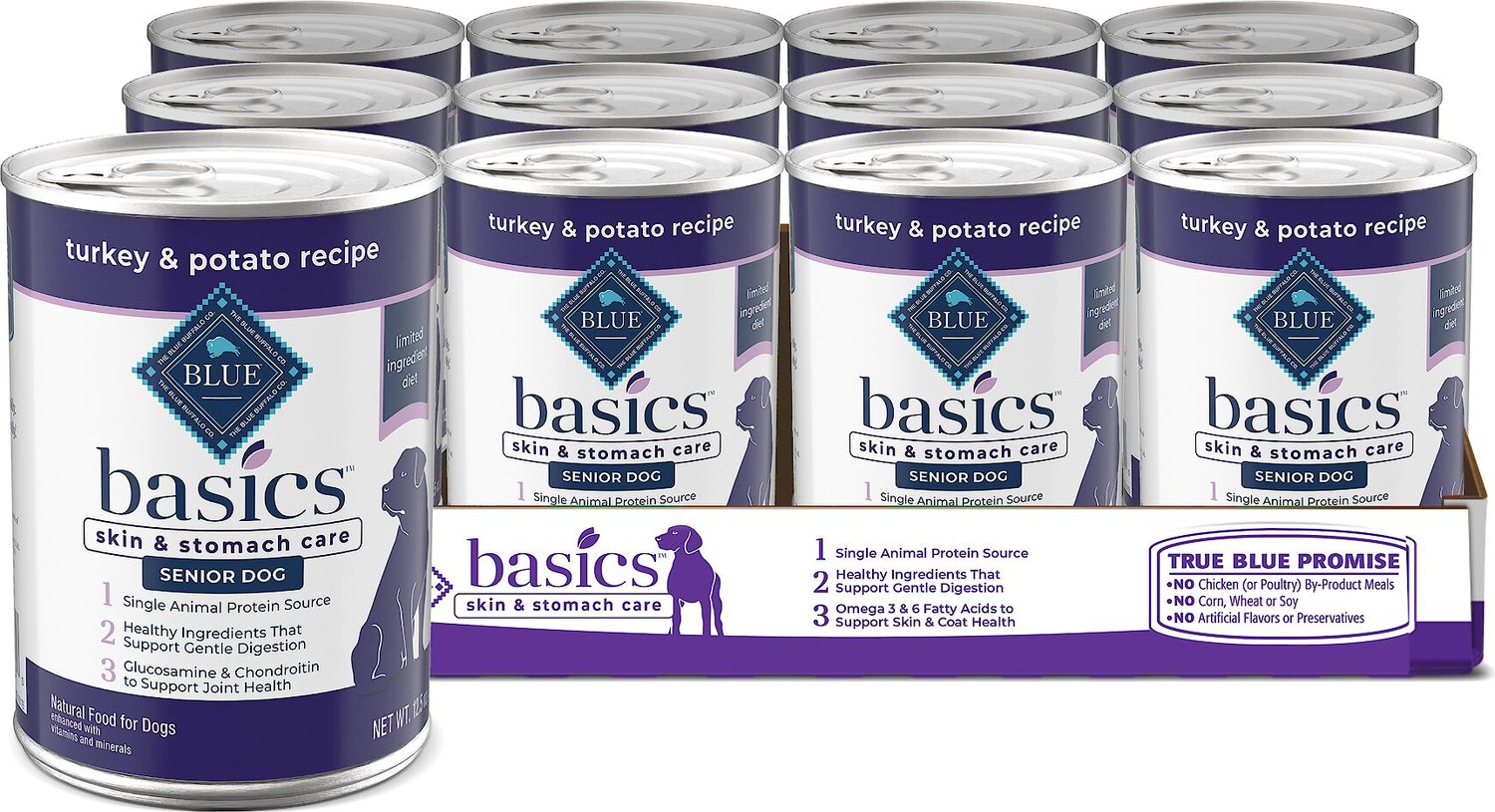Not only do blueberries make a great snack, but they are nutritious as well. They contain many health benefits for both you and your dog. Let’s take a look at some of those health benefits and find out if you should incorporate blueberries into your dog’s healthy diet. Read on to learn more.
Can My Dog Safely Eat Blueberries?
Yes, your dog can eat blueberries. They contain only 84 calories per cup and are packed full of nutrients, making them a healthy snack choice for dogs — especially those that are diabetic. (But you’ll still want to check with your vet first before you offer them.) They also make a great treat for training your dog as an alternative to packaged commercial dog treats.
- 85% fewer carbs that other top brand grain-free foods
- Chicken-based kibble is high-protein
- Added vitamins and minerals for optimal nutrition
- No antibiotics or GMOs
What Are the Health Benefits of Feeding My Dog Blueberries?
Blueberries contain a wide variety of vitamins and minerals, making them a great snack for both humans and dogs alike. They are known to carry the highest amount of antioxidants of any fruit and are also high in fiber. Blueberries are also low in calories and contain various phytochemicals and anthocyanin. All of these things come together in the small package of a blueberry and can help provide your dog with some of the nutrition he needs.
Let’s take a closer look at some of those vitamins and minerals:
- Vitamins: Within blueberries, you’ll find vitamin A, C, and K. Each of these vitamins work together to boost your dog’s immune system, reduce inflammation, and support the proper functioning of its body. It also increases your dog’s skin health, and the quality of its coat, and protects its muscles and nerves. These vitamins can also help to increase bone density—which is important for all dogs, especially seniors and dogs that are very active.
- Minerals: Some of the minerals you will find in blueberries include calcium, potassium, phosphorus, and magnesium. These minerals work to support bone growth and the body’s ability to use its vitamins and minerals more efficiently.
- Antioxidants: Blueberries are probably best known for their antioxidant properties, and there’s a good reason for this. Antioxidants are a crucial part of the diets of both humans and animals. Antioxidants help fight free radicals that are responsible for cellular and molecular damage within the body. They also help to slow down the aging process. Some studies have even shown that adding blueberries to a dog’s diet can help reduce its recovery time after strenuous exercise. This could be a great benefit for active dogs, since it may help increase their mobility as they age.
- Phytochemicals: These are chemical compounds found in plants. They have many health benefits for both humans and dogs and are shown to fight cancer and reduce inflammation in chronic diseases.
- Anthocyanins: These are responsible for giving blueberries their distinctive blue/purple color. They work along with antioxidants to lower the risk of heart disease, diabetes, arthritis, and cancer.
As you can see, blueberries provide many health benefits to dogs. Some manufacturers have even begun adding blueberries as an ingredient in some of their commercial dog food brands.
•Grain-free, limited-ingredient dog food
•Free-range, wild-caught protein options (various)
•For dogs of all life stages
•No added carbohydrates
How Blueberries Can Protect Your Dog’s Brain
The brain uses up more oxygen than any other body tissue. This makes both the brain and the nervous system extremely vulnerable to oxidative stress. If your dog suffers from senility or neurodegenerative disorders it is most likely caused by free-radical damage. Blueberries help fight this damage because of the antioxidants they contain and are able to cross the blood-brain barrier. When your dog consumes blueberries he is also taking in anthocyanins which are the antioxidants we mentioned before. These are then spread throughout the brain, protecting it from the oxidative stress or damage that your dog can be susceptible to. Blueberries are known to contain more of these anthocyanins than any other food—which is quite amazing.
There are also two different types of blueberries: wild and cultivated. Wild blueberries are much smaller than the cultivated ones, and they are often darker in color. The dark color means they contain even more anthocyanins than the cultivated ones (nearly twice the amount). Wild blueberries can also be grown organically, reducing the harmful pesticides and herbicides that your dog may consume from regular blueberries. Consuming fruits that are grown with pesticides or herbicides can actually increase the amount of free-radical damage that your dog is exposed to, so always opt for organic or wild berries when possible.
•Formulated for weight management of senior dogs
•L-carnitine for converting fat to energy
•Key ingredients for better digestion
•Multiple size options for bag
How Many Blueberries Can My Dog Eat?
Even though blueberries are a very healthy food choice, you still want to exercise caution when giving them to your dog. As with any fruit or vegetable, portion control is key. Treats like blueberries, although healthy, should still only compromise 10% of your dog’s diet. They should be considered as an occasional treat and never a replacement for a meal. For most small dogs, 10 blueberries would be an appropriate amount to give, while larger dog breeds can tolerate a bit more. Just keep in mind the 10% ratio when offering them to your dog.
Since blueberries are so small, it can be easy for a large dog to eat way too many before you realize how much they’ve had. Many dogs also tend to eat without chewing which can cause a stomachache or even a choking hazard. Small dogs are especially at risk of choking if they eat the blueberries too fast or if they are offered frozen.
For owners that grow blueberry bushes in their gardens, you’ll want to make sure that you keep an eye on your dog when he’s out in the yard so that he doesn’t feast on the blueberries unsupervised. The bush itself is not toxic to your dog but if it has been sprayed with pesticides or herbicides it can make your dog very ill.
Some dogs (about 10% of them) can show intolerances or in some cases allergies to new foods. So if you plan to feed your dog blueberries for the first time, it’s always a good idea to be nearby so that you can keep an eye on your dog to see how he responds to them. Some signs that your dog has a sensitivity to blueberries include gastrointestinal upset, chronic gas, itchiness, hives, or ear inflammation. If you notice any of these symptoms in your dog you should stop giving him blueberries right away and reach out to your vet.
Can My Dog Have Blueberry Muffins?
Muffins that are prepared for people are not a good snack option for dogs. This is because they’ll typically have ingredients in them that are not healthy for your dog to consume, such as added sugar and milk ingredients. Some of the ingredients may cause food intolerances in your dog and lead to an upset stomach. It is for these reasons that you would want to refrain from giving your dog commercially prepared blueberry yogurt, pies, pancake, muffins, or anything with artificial blueberry flavoring.
- Contains turkey broth for extra moisture
- Added vitamins and minerals
- Contains a single animal protein source - deboned turkey
- Grain-free
What Are Some Ways I Can Feed My Dog Blueberries?
- Fresh: The simplest and easiest way to serve blueberries to your dog is to simply offer them fresh. When blueberries are fresh, the fruit is soft and there isn’t much risk of your dog choking on them. To prepare fresh blueberries, just rinse them in water and inspect them for any mold before serving them to your dog.
- Frozen: You can give your dog frozen blueberries, but be aware that this can present a choking hazard—especially for small dog breeds. You can thaw frozen blueberries out and then mash them prior to serving if you want to make them safer for your dog to consume without the choking hazard. Larger dogs will also need supervision if you plan on serving them frozen blueberries. If you serve them this way, try only giving your dog one or two blueberries at a time as you keep an eye on them.
- Pureed: You can puree the blueberries and add them to yogurt of coconut water. Then put the mixture into ice cube trays and freeze them for a hydrating, cold snack on hot summer days.
- Mashed: Mashing the blueberries up and then adding them to your dog’s food bowl is a great way to add a boost of healthy nutrition to your dog’s healthy meal.
Blueberries are a very versatile, healthy snack and many dogs will eagerly accept them as a treat. You can try any of these methods of serving them to your dog and see which one he likes best. You can also try combining them with yogurt, bananas, mangos, or pineapple for a refreshing dog-friendly fruit salad.
Overall
Blueberries are considered to be a superfood and they make a great, healthy, nutritious snack for your dog. As long as you feed your dog the proper portion size and serve them as an occasional treat, your dog should be able to enjoy them without any negative health impacts. As with any new food, you should only introduce a small number of blueberries into your dog’s diet to see how he handles it before giving him more. If you notice any signs of intolerance or allergies, you should stop feeding your dog blueberries and consult your veterinarian for further advice.
The photo featured at the top of this post is © iStock.com/Joshua Wilder Oakley
Ready to discover the top 10 cutest dog breeds in the entire world?
How about the fastest dogs, the largest dogs and those that are -- quite frankly -- just the kindest dogs on the planet? Each day, AZ Animals sends out lists just like this to our thousands of email subscribers. And the best part? It's FREE. Join today by entering your email below.
Thank you for reading! Have some feedback for us? Contact the AZ Animals editorial team.










